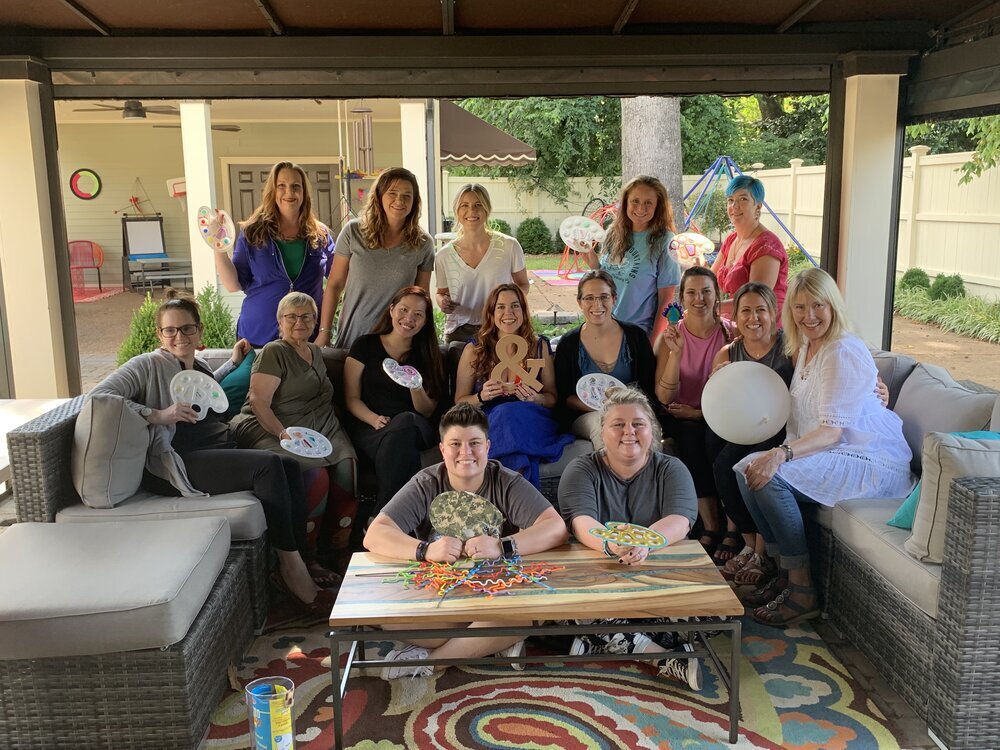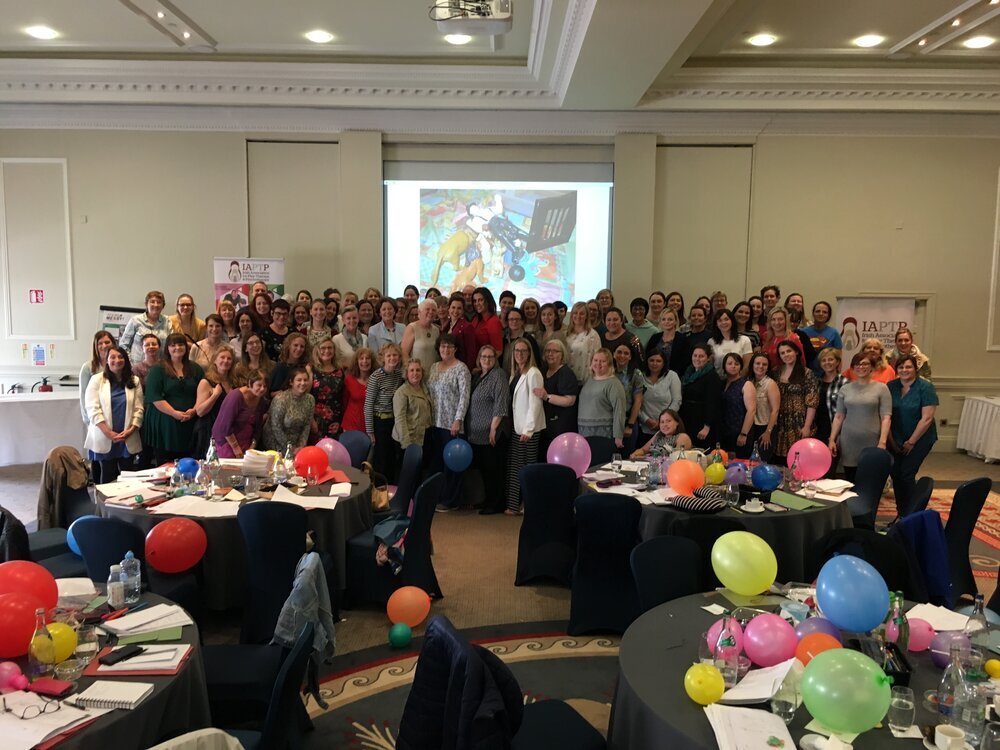
Speaking Engagements
Paris Goodyear-Brown is an internationally renowned speaker who travels the globe teaching clinicians trauma-informed approaches to working with children and families and equipping parents, teachers, and caregivers who work with kids from hard places. She has presented in all fifty states and recently gave a TedxTalk called Trauma and Play Therapy: Holding Hard Stories. She offers both live and on-line training events through the TraumaPlay™ Institute (www.traumaplayinstitute.com) and loves tailoring training to the needs of parents and professionals.
Paris trains organizations, agencies, and institutions of all sizes and is invited to keynote a variety of conferences. A selection of trainings are offered below. Click on a title to see a more detailed description. Trainings can be presented in blocks of time ranging from 45 minute keynotes to multiple day deep dive trainings into educational and experiential content. Contact trainings@parisgoodyearbrown.com to begin crafting the event you need!











Testimonials
“I have been doing this work and coming to training events for 20 years. This day of learning with Paris was by far the most inspiring and practically useful day of training-would love to learn more from her!”
— Sarabeth, LMFT
“This training was the most valuable of the week. I learned so many new interventions. Your ability to explain why and how to do activities was so helpful. I am going to have so many great ideas to bring back to clients for trauma narrative work.”
— participant, Krimes Against Kids conference
“Paris combines a passion that is inspiring with a finessed ability to meet children and parents where they are and help them grow from hard places.”
— Laura, LPC
“Best session I attended at this conference! The presenter seemed to be a master clinician who understands children and her work very well. She was creative in her teaching style, which kept the audience engaged, and left me inspired in my own work of play therapy”
— therapist, Child Abuse Symposium
Paris’s Workshops
-
TraumaPlay™: A Flexibility Sequential Play Therapy Model for Treating Traumatized Children
Learn how to use this playful, components-based, evidence-informed treatment with traumatized children and teens. Paris will share her flexible, sequential model, identifying specific treatment goals with corresponding interventions. She will differentiate between trauma treatment goals that are can be accomplished through non-directive methods and goals that are best served by integrating parents as partners, utilizing somatic grounding techniques, cognitive-behavioral play therapy interventions, expressive therapy techniques, dyadic work, and playful ways to complete trauma narrative work. Participants will leave with an expanded toolkit of interventions and a revived sense of excitement about the process. Come prepared to play!
-
Big Behaviors in Small Containers
When it comes to working with children, sometimes the biggest behaviors come in the smallest containers. Sometimes these behaviors are externalizing (screaming, crying, hitting) and sometime these are internalizing (anxiety, depression, suicidal ideation). So often, the focus of treatment in these instances is on extinguishing the behavior without understanding what is driving it in the first place. Whether the end result involves a child shutting down or shouting out, it is critical that helping professionals be able to answer this key question: What is the need underlying the behavior? This workshop will offer more than a dozen practical, fun, and immediately useful play therapy interventions that engage the family in setting treatment goals, augmenting adaptive coping, enhancing the healthy attachment between parent and child while helping them shift paradigms around problematic child behaviors. Powerful exploration of the stress response system help clients increase anger management skills, expand emotional literacy, practice pro-social skills with family and friends, address their difficult thoughts, and increase coherence in their trauma narratives.
-
Using Sandtrays Effectively in the Playroom: When to Witness and When to Wonder
This workshop will review the basics of choosing sand, sand trays, and miniatures but will dive deeply into the continuum of non-directive to directive uses of the sandtray in mental health work with children, teens, and parents. The power of witnessing, the ways in which this might look different with clients of different developmental levels, and when to give more directive prompts or move into a posture of curiosity with a client will be discussed. Clinicians will leave with new sandtray tools for their toolkit.
-
Be My Safe Boss: Helping Caregivers Co-Regulate Children in Distress
Many parents need help co-regulating their children more effectively. This workshop will introduce a set of strategies codified in the acronym SOOTHE that expand the parenting toolkits of children who have experienced trauma or neglect, children who rage in anger, carry anxiety, or are highly sensitive children. While behavior management tools can be helpful, this workshop offers help to parents for whom traditional parenting strategies are not working. The workshop can be geared for clinicians or for parents and can be given in a 45-minute window or as a half-day workshop.
-
From Regulation to Reason: Helping Children Grow Their Executive Functioning Skills
Teachers are more challenged than ever before as they attempt to teach academics to children who have not had their lower brain regions regulated. This workshop will offer a neurobiologically informed approach for teachers to implement in the classroom that focuses on regulation and connection prior to academic learning. Classrooms that implement this approach see an increase in social kindness and connection in the classroom while also seeing gains in educational performance.
-
How Children Tell: Extra-Linguistic Trauma Narrative Work
Sometimes there are no words. Trauma can be stored iconically and somatically, requiring the engagement of the right hemisphere through play and expressive arts work, as well as bilateral integration work. So to help children “speak” the unspeakable, we offer them drawing, music, sand trays, miniatures, puppets, poetry, and more. This talk will begin with key concepts in creating trauma narratives and end with multiple examples of trauma narrative work in each of the above modalities.
-
Tackling Touchy Subjects: Body Safety Curriculum for Sexual Abuse Prevention and Recover
This curriculum begins with a celebration of our bodies, playfully approaches private parts and public parts, offers nuance in when, where, how and with whom children may engage in various forms of touch, body autonomy, and safe and unsafe secrets. The curriculum offers multiple play therapy interventions for empowering children to set verbal and physical boundaries with others. Components of the curriculum are most appropriate for families of children with sexual behavior problems or in families who are working to develop safety procedures or new sexual behavior rules following inappropriate sexual behavior. This workshop can be given in a 90-minute format or a half-day workshop.
-
Creative Interventions for Problems of Dysregulation
This workshop will talk about the neurobiological underpinnings of dysregulation that can lead to diagnoses of ADHD, ODD, and Disruptive Mood Dysregulation Disorder. This workshop will offer a multitude of play therapy techniques for helping children with affect-regulation, soothing the physiology, impulse-control, emotional literacy, and social skills. This workshop can be presented in a half-day, full-day, or two-day workshop.
-
Developing Compassion for Yourself and Your Kids
It can be difficult to hold the brokenness within our children when we have not accepted the brokenness within ourselves. Many parents want to be able to connect more deeply with their children. Parents want to offer kindness and compassion, but this is difficult to do with our children if we have not extended compassion to our own vulnerabilities and weaknesses. Come and learn strategies for remaining more present and mindful with ourselves and our children.
-
Delight in Me: Play Therapy for Attachment Issues
This workshop will focus on enhancing our capacities as clinicians to help children and their parents heal or enhance their attachment relationships with each other. Much of the time will be spent translating core attachment principles into practical play-based strategies for enhancing dyadic attunement, building connections, effectively soothing the child, lightening difficult discipline moments, creating and rehearsing coherent narratives, and maximizing delight. Practical ways to help parents become more effective co-regulators of their children will be described and modeled. Many dyadic nurturing games will be shared and practiced. Time will also be spent on bringing back the joy in our own work and delighting in each other. The workshop format will include experiential activities aimed at helping clinicians grapple with their own attachment relationships, build their own family narratives and enhance the delight in their own relationships in order to become better agents for fostering delight in our client systems. Come prepared to play!
-
The Worry Wars: Play Therapy for Anxiety Disorder
This workshop will synthesize the current research and literature on treating anxiety disorders into a developmentally sensitive play therapy approach. Fighting our fear can be difficult, especially for children who may need to externalize the fear, who literally need to put a face on it, in order to begin mastering it. Participants will learn dozens of techniques to help children articulate their worries, interventions that aid in relaxation and stress management, and strategies for including parents as partners in the process. Clinicians will learn play-based interventions that help craft “boss back” talk and counter cognitive distortions. Playful tools for designing and tracking gradual exposures will also be covered. Specific play therapy techniques will be augmented by detailed case examples, video clips, slides of children’s completed therapeutic creations, and experiential learning.
-
Synaptic Storytelling: The Neuroscience of Narrative Work in TraumaPlay™
The stories we are told are the stories we become…until we write a new story. Play therapy provides the perfect environment for transforming narratives that hurt us into narratives that heal us. distress, scaffolding an understanding of the neurobiology of play, the neurobiology of trauma,TraumaPlay therapists work to hold the hard stories of families in distress, scaffolding an understanding of the neurobiology of play, the neurobiology of trauma, and the power of one to heal the other. Ongoing person of the play therapist work includes stretching our abilities to lean into, instead of away from, hard things. Play therapists are constantly nuancing narratives for children, attempting to tell the truth in a developmentally sensitive way while avoiding colluding with a family’s silence in the wake of trauma. This workshop will address multiple play therapy interventions for storytelling and storykeeping with children, their parents, and the whole family system.
-
Balancing on the Head of a Pin: Play Therapy for Anxiety, Anger, and Other Forms of Dysregulation
Play therapy for anxiety, anger, and excitation. Participants will explore the physiological confusion that often results with dysregulated children and teens as their stress response systems work to keep up with the pressures of our world. Participants will learn techniques to help children articulate their worries and/or anxiety provoking situations; establish emotional granularity, soothe the physiology, and ask for what they need strategies for including parents as partners in the process will be addressed. Clinicians will learn play-based interventions that help craft "boss back" talk and counter cognitive distortions. Playful tools for designing and tracking gradual exposures will also be covered. Specific play therapy techniques will be augmented by detailed case examples, video clips, slides of children’s completed therapeutic creations and experiential learning.
-
Parents as Partners
Parents can be powerful allies in the play therapy process, especially when working with traumatized children. TraumaPlay™ principles for helping caregivers become more connected co-regulators, stronger storykeepers, and safer bosses set the stage for a host of play therapy interventions that target treatment goals for parents. Clinicians will leave with new ways to provide playful psychoeducation, in vivo doses of delight between parent and child, help parents with their own negative activation, and co-create coherent narratives about hard things. Person of the play therapist reflection will also be shared.
